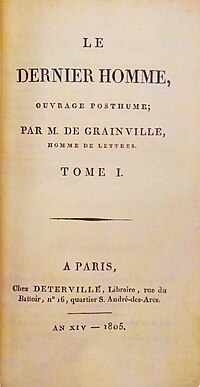Le Dernier Homme

Title page of 1805 first edition of Le Dernier Homme
|
|
| Author | Jean-Baptiste Cousin de Grainville |
|---|---|
| Country | France |
| Language | French |
| Genre | Science fantasy, Dying Earth subgenre |
| Publisher | Deterville |
|
Publication date
|
1805 |
| Media type | |
Le Dernier Homme (English: The Last Man) is a French science fantasy novel in the form of a prose poem. Written by Jean-Baptiste Cousin de Grainville and published in 1805, it was the first story of modern speculative fiction to depict the end of the world. Considered a seminal early work of science fantasy, specifically of the dying earth subgenre, it has been described by Gary K. Wolfe as "A crucial document in the early history... of what became science fiction".
Le Dernier Homme was translated into English in 1806 - poorly, and neither credited to de Grainville nor described as a translation from a French original – under the title Omegarus and Syderia, a Romance in Futurity. This translation remained the only English version available until 2003, when a new translation by I. F. Clarke and Margaret Clarke was published.
De Grainville was inspired by Milton's epic poem Paradise Lost. Where Milton's work featured the first couple, Adam and Eve, de Grainville writes of the last couple – Omegarus and Syderia. Influences from the Biblical Book of Revelation are also seen in the concept that the earth has a predestined day of ending. The influence of Malthusian ideas is also seen, as de Grainville writes at one point of an earth out of balance, population outstripping resources.
The work was published in 1805 due to the advocacy of the French literary figure Jacques-Henri Bernardin de Saint-Pierre, who persuaded the Paris publisher Deterville to offer the book. By the time the book was published, de Grainville was dead, a suicide in February of that year. The first publication failed to attract any critical notice or sales, but was championed by Herbert Croft, who published a second edition in two volumes, in 1811. This second edition did garner the attention of critics, who praised it.
...
Wikipedia
